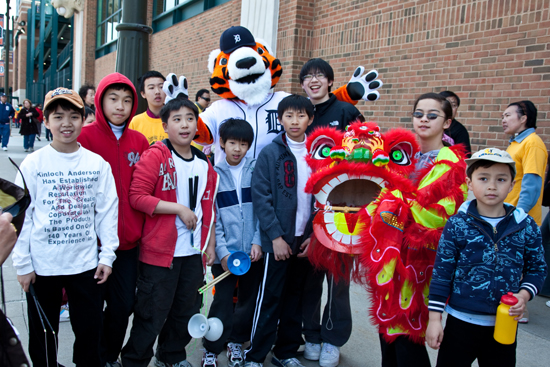Deciphering and accessing the language and culture of American sports

Ann Arbor Chinese Center of Michigan Chinese Yo-Yo and Lion Dance Troupes with the Detroit Tiger: L-R Dallan Roan, Curtis Lee, Chris Chen, Curtis Fang, The Detroit Tiger, Arthur Yang, Patrick Pang, my daughter Niu Niu, and my son Little Brother.
Photo Courtesy of Andrew Fang, www.Photasa.com
Sports are such an integral part of American culture that many take it for granted that everybody already knows how to play. When I was in eighth grade, the Physical Education teacher did not teach us how to play baseball, she just threw us out there with some bats and balls, and everyone else knew what to do and started playing. I did not even know how to hold the bat, let alone how or when to swing. I was terrified.
When my children started playing soccer in kindergarten, I always went to their practices at the park down the street, with the dog and their younger siblings. However, it was not until six years later that I suddenly realized that I was supposed to be going to their games every week, not their practices. Nobody ever told me. How was I supposed to know?
I know that a lot of it is just me and my general level of non-sportiness, but some of it is cultural, too. Other cultures are interested in sports, just different sports. Go to University of Michigan’s Pierpont Commons during a World Cup soccer game and you will see.
My classmate Eddie’s mom, an immigrant from Taiwan, did not let that stop her. Eddie’s dad was a rising star at IBM, but he needed to understand football in order to make small talk and build rapport with others. So Eddie’s stay-at-home mom spent her days watching hours and hours of football until she finally deciphered the game and could explain the rules and the teams and the point (or should that be “talking points”) to Eddie’s dad.
While watching middle school track meets, my friend Robert, who ran track in college, points across the field and teaches me how to “read” the events: “That runner started off too fast and will get tired before the end.” This changes everything, finally gives me access.
Because this is the Chinese Year of the Tiger, the Detroit Tigers celebrated their first home game with a big Chinese New Year Parade with Lion Dancing, Chinese Yo-Yo and more. Many Ann Arbor groups participated, including Ann Arbor Chinese Center of Michigan, Ann Arbor Traditional Chinese Music Ensemble, Michigan Taiwanese American Association, Chinese American Society of Ann Arbor, Asian Martial Arts Studio and Ann Arbor Area Families with Children from China. I thought this would be a good opportunity to take the children to their first baseball game.
Walking up, we admired the big burly “bears” that were leaping out of the Tiger Stadium façade. It was not until we got up close and had walked around the entire stadium that we figured out that those were not bears, but tigers. Duh. It was another week before my friend Roland explained that Comerica Park was not Tiger Stadium.
However, being swept along with the crowd, buying hot dogs in the stands, doing The Wave, was fun. Infectious. American. Thank goodness for the scoreboard explaining who everyone was and what was happening on the field.
Frances Kai-Hwa Wang is a second-generation Chinese American from California who now divides her time between Ann Arbor and the Big Island of Hawaii. She is editor of IMDiversity.com Asian American Village, lead multicultural contributor for AnnArbor.com and a contributor for New America Media's Ethnoblog. She is a popular speaker on Asian Pacific American and multicultural issues. Check out her Web site at franceskaihwawang.com, her blog at franceskaihwawang.blogspot.com, and she can be reached at fkwang888@gmail.com.


Comments
braggslaw
Sun, Apr 25, 2010 : 10:26 p.m.
Wolverine366., Sad to hear about your cancer. I have never experienced the agony (emotionally and mentally) that you feel. I hope you recover.
Wolverine3660
Sun, Apr 25, 2010 : 10:05 p.m.
braggslaw- the thousands of miles I ran each year to keep with with Coach;s plans during my U-M undergrad days, have given me the moral and psychological strength to deal with 13 years of cancer and related medical problems, without becoming a psychological basket-case.
braggslaw
Sun, Apr 25, 2010 : 3:29 p.m.
Sports mirror capitalism (in a good way). Honest competition, hard work (a bit of natural talent) = success and a drive to be the best. I credit the 1000 miles I would run each summer in preparation for cross country as strengthening my work ethic. Compared to an anaerobic burning in your glutes/ hammies and quads, learning organic chemistry seems easy.
Frances Kai-Hwa Wang
Sun, Apr 25, 2010 : 9:48 a.m.
oops. got it. thanks.